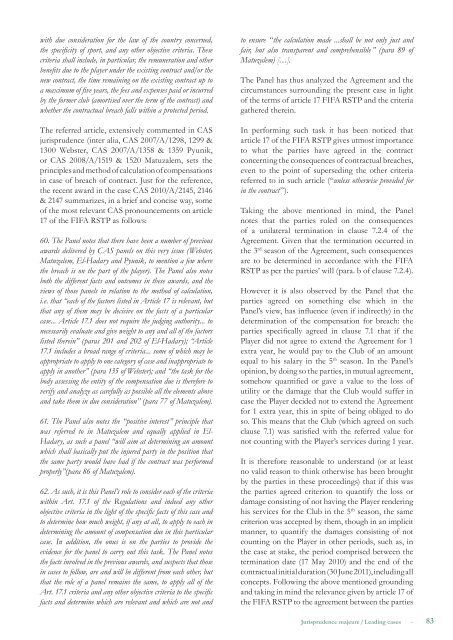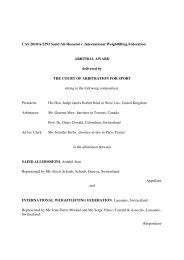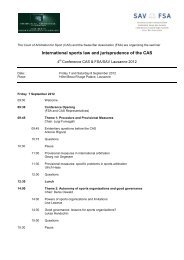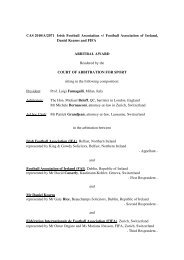(CAS) Bulletin - Tribunal Arbitral du Sport / TAS
(CAS) Bulletin - Tribunal Arbitral du Sport / TAS
(CAS) Bulletin - Tribunal Arbitral du Sport / TAS
You also want an ePaper? Increase the reach of your titles
YUMPU automatically turns print PDFs into web optimized ePapers that Google loves.
with <strong>du</strong>e consideration for the law of the country concerned,<br />
the specifi city of sport, and any other objective criteria. These<br />
criteria shall include, in particular, the remuneration and other<br />
benefi ts <strong>du</strong>e to the player under the existing contract and/or the<br />
new contract, the time remaining on the existing contract up to<br />
a maximum of fi ve years, the fees and expenses paid or incurred<br />
by the former club (amortised over the term of the contract) and<br />
whether the contractual breach falls within a protected period.<br />
The referred article, extensively commented in <strong>CAS</strong><br />
jurisprudence (inter alia, <strong>CAS</strong> 2007/A/1298, 1299 &<br />
1300 Webster, <strong>CAS</strong> 2007/A/1358 & 1359 Pyunik,<br />
or <strong>CAS</strong> 2008/A/1519 & 1520 Matuzalem, sets the<br />
principles and method of calculation of compensations<br />
in case of breach of contract. Just for the reference,<br />
the recent award in the case <strong>CAS</strong> 2010/A/2145, 2146<br />
& 2147 summarizes, in a brief and concise way, some<br />
of the most relevant <strong>CAS</strong> pronouncements on article<br />
17 of the FIFA RSTP as follows:<br />
60. The Panel notes that there have been a number of previous<br />
awards delivered by <strong>CAS</strong> panels on this very issue (Webster,<br />
Matuzalem, El-Hadary and Pyunik, to mention a few where<br />
the breach is on the part of the player). The Panel also notes<br />
both the different facts and outcomes in these awards, and the<br />
views of those panels in relation to the method of calculation,<br />
i.e. that “each of the factors listed in Article 17 is relevant, but<br />
that any of them may be decisive on the facts of a particular<br />
case... Article 17.1 does not require the judging authority... to<br />
necessarily evaluate and give weight to any and all of the factors<br />
listed therein” (paras 201 and 202 of El-Hadary); “Article<br />
17.1 includes a broad range of criteria... some of which may be<br />
appropriate to apply to one category of case and inappropriate to<br />
apply in another” (para 135 of Webster); and “the task for the<br />
body assessing the entity of the compensation <strong>du</strong>e is therefore to<br />
verify and analyze as carefully as possible all the elements above<br />
and take them in <strong>du</strong>e consideration” (para 77 of Matuzalem).<br />
61. The Panel also notes the “positive interest” principle that<br />
was referred to in Matuzalem and equally applied in El-<br />
Hadary, as such a panel “will aim at determining an amount<br />
which shall basically put the injured party in the position that<br />
the same party would have had if the contract was performed<br />
properly”(para 86 of Matuzalem).<br />
62. As such, it is this Panel’s role to consider each of the criteria<br />
within Art. 17.1 of the Regulations and indeed any other<br />
objective criteria in the light of the specifi c facts of this case and<br />
to determine how much weight, if any at all, to apply to each in<br />
determining the amount of compensation <strong>du</strong>e in this particular<br />
case. In addition, the onus is on the parties to provide the<br />
evidence for the panel to carry out this task. The Panel notes<br />
the facts involved in the previous awards, and suspects that those<br />
in cases to follow, are and will be different from each other, but<br />
that the role of a panel remains the same, to apply all of the<br />
Art. 17.1 criteria and any other objective criteria to the specifi c<br />
facts and determine which are relevant and which are not and<br />
to ensure “ the calculation made ...shall be not only just and<br />
fair, but also transparent and comprehensible ” (para 89 of<br />
Matuzalem) […].<br />
The Panel has thus analyzed the Agreement and the<br />
circumstances surrounding the present case in light<br />
of the terms of article 17 FIFA RSTP and the criteria<br />
gathered therein.<br />
In performing such task it has been noticed that<br />
article 17 of the FIFA RSTP gives utmost importance<br />
to what the parties have agreed in the contract<br />
concerning the consequences of contractual breaches,<br />
even to the point of superseding the other criteria<br />
referred to in such article (“unless otherwise provided for<br />
in the contract”).<br />
Taking the above mentioned in mind, the Panel<br />
notes that the parties ruled on the consequences<br />
of a unilateral termination in clause 7.2.4 of the<br />
Agreement. Given that the termination occurred in<br />
the 3 rd season of the Agreement, such consequences<br />
are to be determined in accordance with the FIFA<br />
RSTP as per the parties’ will (para. b of clause 7.2.4).<br />
However it is also observed by the Panel that the<br />
parties agreed on something else which in the<br />
Panel’s view, has infl uence (even if indirectly) in the<br />
determination of the compensation for breach: the<br />
parties specifi cally agreed in clause 7.1 that if the<br />
Player did not agree to extend the Agreement for 1<br />
extra year, he would pay to the Club of an amount<br />
equal to his salary in the 5 th season. In the Panel’s<br />
opinion, by doing so the parties, in mutual agreement,<br />
somehow quantifi ed or gave a value to the loss of<br />
utility or the damage that the Club would suffer in<br />
case the Player decided not to extend the Agreement<br />
for 1 extra year, this in spite of being obliged to do<br />
so. This means that the Club (which agreed on such<br />
clause 7.1) was satisfi ed with the referred value for<br />
not counting with the Player’s services <strong>du</strong>ring 1 year.<br />
It is therefore reasonable to understand (or at least<br />
no valid reason to think otherwise has been brought<br />
by the parties in these proceedings) that if this was<br />
the parties agreed criterion to quantify the loss or<br />
damage consisting of not having the Player rendering<br />
his services for the Club in the 5 th season, the same<br />
criterion was accepted by them, though in an implicit<br />
manner, to quantify the damages consisting of not<br />
counting on the Player in other periods, such as, in<br />
the case at stake, the period comprised between the<br />
termination date (17 May 2010) and the end of the<br />
contractual initial <strong>du</strong>ration (30 June 2011), including all<br />
concepts. Following the above mentioned grounding<br />
and taking in mind the relevance given by article 17 of<br />
the FIFA RSTP to the agreement between the parties<br />
Jurisprudence majeure / Leading cases<br />
-<br />
83





